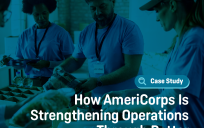If you were the CEO of a company and told that all you need to do is copy your competitor – you would find it charmingly naive.
 Yet, this is what we often demand of governments. So and so built this tool – just copy it. Or this worked here, copy it.
Yet, this is what we often demand of governments. So and so built this tool – just copy it. Or this worked here, copy it.
I’m not against studying and learning from others. We do this all of the time. But in the government data space, there has been a push for replication, in particular for data science.
The civic technology community also worries about insufficient project replication. One example is the possible duplication between the USDS Digital Services Playbook and the 18F guides. Why aren’t these groups collaborating to create joint playbooks and guides? Why reinvent the wheel?
Focusing too much on project replication ignores three truths:
- The role of organizational learning: When a team or group creates or builds something, organizational learning happens. And it’s organizational learning that will ultimately lead to structural and persistent change. Simply copying something ignores the importance of learning.
- The sustainability of local ownership: Early in my career, someone said to me, “People don’t do what they don’t own.” I keep this little tidbit posted in my workspace so I see it every day. When you own something, you are part of why it exists and its shape. You establish commitment to it and are invested in making it work. Part of ownership is making it yours – not simply copying it.
- The needs, priorities and context of the would-be replicator: I’ve been approached many times about replicating a data science project. My response is inevitably along the lines of a) that’s not an issue here; b) interesting but not a priority; or c) there isn’t a feasible implementation path.
For data science projects, a focus on replicating algorithms is particularly problematic because:
- Data structure and quality can vary a great deal between jurisdictions and
- An algorithm that leads to a business or service change in one jurisdiction may not be applicable in another. And without a business change, it’s just an academic exercise.
In praise of process replication (and adaptation)
Instead of focusing on project replication – focus on process replication and adaptation.
San Francisco is part of the Civic Analytics Network (CAN), convened by Harvard Data-Smart and initially funded by the Arnold Foundation. Through CAN, we have replicated and adapted many of one another’s processes and approaches, including how to solicit data science projects.
At DataSF, we receive many questions about how we manage our work. The vast majority of the questions are about process. This in part prompted us to document our work in a growing online resource library.
I’m not saying project replication is impossible. Many jurisdictions have replicated our Data Academy, for example. But it works best when there is a similar need and the local jurisdiction adapts it as needed.
So, don’t abandon project replication. But start recognizing that process replication is just as, if not more, valuable.
Joy Bonaguro is part of the GovLoop Featured Contributor program, where we feature articles by government voices from all across the country (and world!). To see more Featured Contributor posts, click here.





Thanks for sharing Joy. It’s a nice read and very relevant.